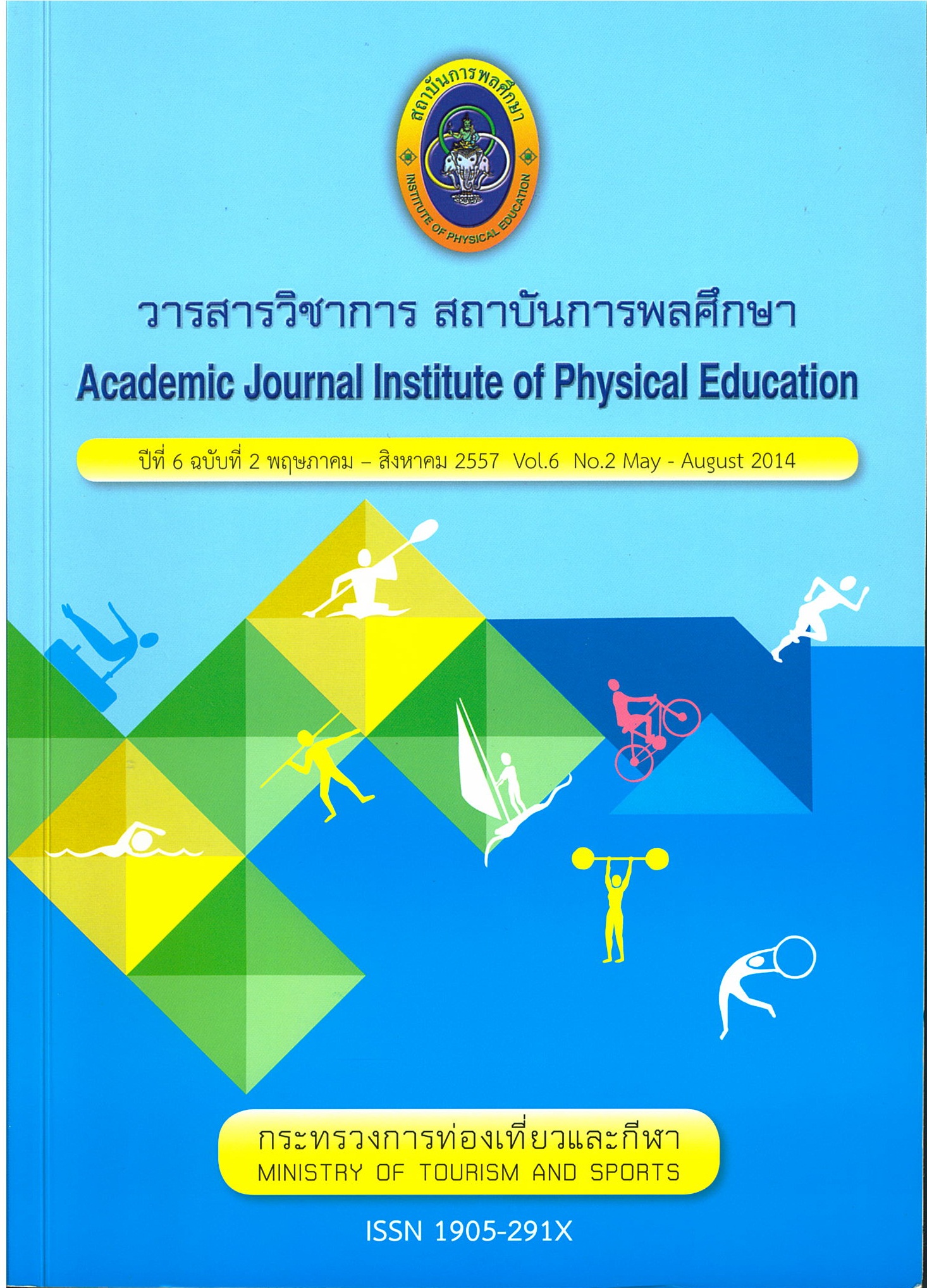การเพิ่มคุณค่าโปรแกรมการฝึกกีฬาเทควันโด เพื่อพัฒนาคุณภาพชีวิตของเด็กด้อยโอกาส
Main Article Content
บทคัดย่อ
การวิจัยครั้งนี้มีวัตถุประสงค์เพื่อ 1) ศึกษาการเพิ่มคุณค่าโปรแกรมการฝึกกีฬาเทควันโด เพื่อพัฒนา คุณภาพชีวิตของเด็กด้อยโอกาส 2) เปรียบเทียบคุณภาพชีวิตของเด็กด้อยโอกาสก่อนฝึกระหว่างฝึกและ หลังฝึกกีฬาเทควันโด เป็นการวิจัยเชิงทดลอง และการวิจัยเชิงคุณภาพโดยศึกษาคุณค่าที่ได้จากการฝึกกีฬา เทควันโด ด้านร่างกาย จิตใจ อารมณ์ และสังคม กลุ่มตัวอย่างที่ใช้ในการวิจัย เป็นเด็กด้อยโอกาสที่กําลัง ศึกษาอยู่ที่โรงเรียนเฉลิมพระเกียรติ 48 พรรษา จ.ลําพูน ภาคเรียนที่ 1 ปีการศึกษา 2554 จํานวน 60 คน แบ่งเป็นกลุ่มทดลอง และกลุ่มควบคุม กลุ่มละ 30 คน ดําเนินการฝึกตามโปรแกรมการฝึกที่ผู้วิจัยได้สร้างขึ้น โดยมีการทดสอบก่อนการทดลอง ระหว่างการทดลองและหลังเสร็จสิ้นการทดลอง เครื่องมือที่ใช้ในการ วิจัยคือโปรแกรมการฝึกกีฬาเทควันโด ดําเนินการฝึกเป็นเวลา 16 สัปดาห์ สัปดาห์ละ 2 คาบ คาบละ 2 ชั่วโมง รวมทั้งหมด 32 คาบ และแบบทดสอบก่อนทดลอง ระหว่างทดลอง และหลังทดลอง ทั้ง 4 ด้าน คือ ด้านร่างกาย ด้านจิตใจ ด้านอารมณ์ และด้านสังคม ได้แก่ การเห็นคุณค่าในตนเอง ความมีน้ําใจ นักกีฬา ความฉลาดทางอารมณ์ การปรับตัวทางสังคม และสมรรถภาพทางกาย สถิติที่ใช้ ได้แก่ ความถี่ ร้อยละ ค่าเฉลี่ย ส่วนเบี่ยงเบนมาตรฐาน การวิเคราะห์ความแปรปรวนแบบผสม (Mixed ANOVA)
ผลการวิจัยพบว่า 1) โปรแกรมการฝึกกีฬาเทควันโดที่เพิ่มคุณค่าของโปรแกรมการฝึกมีผลต่อการ พัฒนาคุณภาพชีวิตของเด็กด้อยโอกาสที่เรียนตามโปรมแกรมนี้ดีขึ้น โดยมีความมีน้ําใจนักกีฬา ความฉลาด ทางอารมณ์ การปรับตัวทางสังคม และสมรรถภาพทางกาย มีค่าเฉลี่ยเพิ่มขึ้น และแตกต่างกันอย่างมี นัยสําคัญทางสถิติที่ระดับ .05 ส่วนการเห็นคุณค่าในตนเองยังไม่แตกต่างกัน 2) การเปรียบเทียบคุณภาพ ชีวิตของเด็กด้อยโอกาส ระหว่างกลุ่มทดลองและควบคุม พบว่าด้านความมีน้ําใจนักกีฬา การปรับตัวทาง สังคม สมรรถภาพทางกาย ด้าน การนั่งงอตัว การดันพื้น การเดินวิ่ง แตกต่างกันอย่างมีนัยสําคัญทางสถิติ ที่ระดับ .05 โดยกลุ่มทดลองมีการพัฒนาดีกว่ากลุ่มควบคุม ยกเว้นด้านการเห็นคุณค่าในตนเอง ความฉลาด ทางอารมณ์ ดัชนีมวลกาย และการนอนยกตัว ยังไม่แตกต่างกัน
ข้อเสนอแนะจากการวิจัย มีดังนี้ 1) ควรนําโปรแกรมการฝึกกีฬาเทควันโดที่เพิ่มคุณค่าไปฝึกให้กับ เด็กด้อยโอกาสในโรงเรียนต่างๆ ทั่วประเทศ 2) โรงเรียนควรจะส่งเสริมให้นักเรียนได้เรียนโปรแกรมการฝึก กีฬาเทควันโดที่เพิ่มคุณค่านี้เพื่อพัฒนาเด็กในด้านร่างกาย จิตใจ อารมณ์ และสังคม 3) หน่วยงานและ องค์กรต่างๆ ที่ทําหน้าที่เกี่ยวกับเด็กและเยาวชนสามารถนําโปรแกรมการฝึกกีฬาเทควันโดนี้ไปใช้เพื่อ พัฒนาคุณภาพชีวิตของเด็กและเยาวชนได้อย่างมีประสิทธิภาพ
Article Details

อนุญาตภายใต้เงื่อนไข Creative Commons Attribution-NonCommercial-NoDerivatives 4.0 International License.
บทความที่ได้รับการตีพิมพ์เป็นลิขสิทธิ์ของวารสารวิชาการ มหาวิทยาลัยการกีฬาแห่งชาติ ข้อความที่ปรากฏในบทความแต่ละเรื่องในวารสารวิชาการเล่มนี้ เป็นความคิดเห็นส่วนตัวของผู้เขียนแต่ละท่านไม่เกี่ยวข้องกับวารสารวิชาการมหาวิทยาลัยการกีฬาแห่งชาติ แต่อย่างใด ความรับผิดชอบองค์ประกอบทั้งหมดของบทความแต่ละเรื่องเป็นของผู้เขียนแต่ละท่าน หากมีความผิดพลาดใดๆ ผู้เขียนแต่ละท่านจะรับผิดชอบบทความของตนเองแต่ผู้เดียว
เอกสารอ้างอิง
คุณลักษณะของนักกีฬาเทควันโด (15 กรกฎาคม 2554). http://wt.ac.th คุณสมบัติของนักกีฬาเทควันโด (10 กรกฎาคม 2554). : http://news.sanook.com/sport/sport137875.php
กระทรวงการท่องเที่ยวและกีฬา. (2556). แผนพัฒนาการกีฬาแห่งชาติ ฉบับที่ 5 (พ.ศ. 2555-2559). กรุงเทพฯ: องค์การค้าของ สกสค.
กรมสุขภาพจิต. (2545). คู่มือความฉลาดทางอารมณ์, นนทบุรี : กระทรวงสาธารณสุข.
จรัญญา ขันกฤษณ์. (2543). การสร้างแบบวัดการเห็นคุณค่าในตนเองของนักเรียนชั้นประถมศึกษาปีที่ 6 โรงเรียนเทศบาลวัดศรีสุพรรณเชียงใหม่, สารนิพนธ์ ศึกษาศาสตรมหาบัณฑิต สาขาวิชาจิตวิทยา การศึกษาและการแนะแนว)บัณฑิตวิทยาลัย มหาวิทยาลัยเชียงใหม่,
ประพัฒน์ ลักษณ์พิสุทธิ์. (มกราคม 2521). “พลศึกษาช่วยปลูกฝังน้ําใจนักกีฬาได้จริงหรือ”. วารสารสุขศึกษาพลศึกษา และนันทนาการ, 1: 35 - 41.
วันเพ็ญ สุมนาพันธ์. (2545). ผลของกิจกรรมกลุ่มสัมพันธ์ที่มีต่อการพัฒนาความรู้สึกเห็นคุณค่าในตนเองของนักศึกษาระดับประกาศนียบัตรวิชาชีพสาขาวิชาช่างอิเลคทรอนิคส์ วิทยาลัยเทคนิค เชียงใหม่, วิทยานิพนธ์ ศึกษาศาสตรมหาบัณฑิต (สาขาวิชาจิตวิทยาการศึกษาและการแนะแนว) บัณฑิตวิทยาลัย มหาวิทยาลัยเชียงใหม่,
วรศักดิ์ เพียรชอบ. (2523), พลศึกษาในสารานุกรมศึกษาศาสตร์ ฉบับเฉลิมพระเกียรติ, กรุงเทพฯ : จุฬาลงกรณ์มหาวิทยาลัย.
สันติ สรรพศรี (2551). แรงจูงใจและการปรับตัวเพื่อสู่ความเป็นเลิศของผู้ที่เข้ามาเรียนเทควันโดในโรงเรียนสอนเทควันโดในอําเภอเมืองเชียงใหม่, วิทยานิพนธ์ วิทยาศาสตรมหาบัณฑิต (สาขาวิทยาศาสตร์การกีฬา) บัณฑิตวิทยาลัย มหาวิทยาลัยเชียงใหม่,
Bowen, Wilbur P. and Mitchell, Elmer D. (1927). The Theory of Organized Play. New York: As Barnes and Company.


